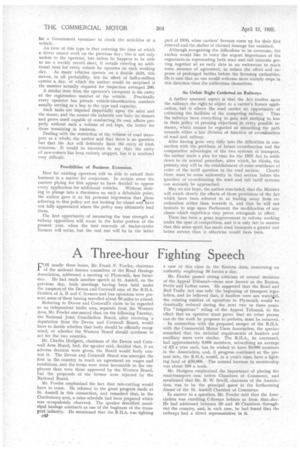A Three-hour Fighting Speech
Page 64

If you've noticed an error in this article please click here to report it so we can fix it.
FOR nearly three hours, Mr. Frank F. Fowler, chairman of the national finance committee of the Road Haulage Association, addressed a meeting at Plymouth, last Saturday. He had made another speech at St. Austell, on the previous day, both meetings having been held under the auspices of the Devon pnd Cornwall area of the R.H.A. Holders of A, B and C licences and bus operators were present, some of them having travelled about 50 miles to attend.
Referring to Devon and Cornwall's claim to be regarded as an independent traffic area, separate from the Western Area, Mr. Fowler announced that, on the following Tuesday, the National Joint Conciliation Board, after receiving a deputation from the Devon and Cornwall Board, would have to decide whether that body should be officially recognized, or whether the Western Board should continue to act for the two counties.
Mr. Charles Hodgson, chairman of the Devon and Cornwall Area Board, had, the speaker said, decided that, if an adverse decision were given, the Board would hotly contest it. The Devon and Cornwall Board was amongst the first in the country to reach an agreement on wages and conditions, and the terms were more favourable to the employers than were those approved by the Western Board, but the proposals of the former were rejected by the National Board.
Mr. Fowler emphasized the fact that rate-cutting would have to cease. He referred to the great progress made at St. Austell in this connection, and remarked that, in the Charlestown area, a rates schedule had been prepared which was scrupulously observed. The speaker described municipal haulage contracts as one of the bugbears of the transport industry. He mentioned that the R H.A. was fighting
c42 a case of this class in the Eastern Area, concerning an authority employing 30 lorries a day.
Mr. Fowler passed strong criticism of several decisions of the Appeal Tribunal—those now known as the Enston, Petrie and Loftus cases. He suggested that the Road and Rail Traffic Act was only the beginning of transport legis, lation, and he believed that, if hauliers were not watchitul, the existing number of operators in Plymouth would be drastically reduced during the next two or three years. The " iniquitous " ruling of the Appeal Tribunal, to the effect that an operator must prove that no other person can do the work he proposes to perform, must be removed.
In connection with the proposed. merger of the R.H.A. with the Commercial Motor Users Association, the speaker remarked that the national requirements of hauliers and ancillary users were similar. The R.H.A., he continued, had approximately 9,000 members, subscribing an average of £2 a year each, but he wished to have 50,000 members in the Association, and, if progress continued at the present rate, the R.H.A. would, in a year's time, have a fighting fund of £50,000. The normal increase in membership was about 100 a week.
Mr. Hodgson emphasized the importance of placing the road-transport case before Chambers of Commerce, and mentioned that Mr. R. W. Sewill, chairman of the Association, was to be the principal guest at the forthcoming dinner of the St. Austell Chamber of Commerce.
In answer to a question, Mr. Fowler said that the Association was enrolling, C-licence holders as from that, day. He had addressed between 30 and 40 Chambers thronghout the country, and, in each case, he had found that the railways had a direct representative in it.












































































































